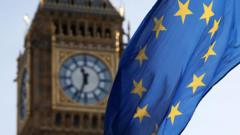The upcoming summit in London marks a pivotal moment in UK-EU relations, with discussions focused on shared foreign policy priorities, security, and trade hurdles that emerged post-Brexit. While both sides face internal pressures and external geopolitical challenges, there’s a mutual desire to foster closer ties without compromising core national interests.
The UK-EU Summit: A New Chapter in Post-Brexit Relations

The UK-EU Summit: A New Chapter in Post-Brexit Relations
As the UK and EU prepare for their first bilateral summit since Brexit, leaders face significant negotiations aimed at enhancing cooperation amid global tensions.
On Monday, leaders from the UK and the European Union will convene in London for their first bilateral summit since Brexit, a significant milestone that captures the shifting dynamics in international relations. As global tensions rise with concerns surrounding Russia and China, both parties are recognizing the need for mutual cooperation amidst an evolving landscape.
Industry experts and officials underscore that the prior bitterness stemming from Brexit has transformed into a collaborative spirit, influenced by pressing global challenges such as the war in Ukraine and changing U.S. foreign policies. According to Anand Menon, director of the think tank "UK in a Changing Europe," this summit is critical for maintaining unity amidst these challenges. Countries across Europe, including France, are showing a willingness to engage despite historical friction.
Recent developments highlight this changing tone; the UK’s invitation for French President Emmanuel Macron to make a state visit reflects a strategy to mend ties. As discussions approach their culmination, insiders reveal an intense focus on negotiations regarding a joint declaration and an EU-UK security and defense pact.
The anticipated announcements aim to address foreign policy issues, including support for Ukraine and constraints on Russian aggression, alongside proposals to alleviate trade barriers that emerged post-Brexit. However, the expected outcomes also illustrate the cautious approach of the Labour government, which seeks to maintain key red lines concerning customs union and single market participation.
Amidst talks about economic growth, the summit's agenda includes a proposal for a plant and animal health agreement, which aims to streamline trade in agricultural products but raises concerns about ongoing EU regulatory alignment. Fishing rights also remain a contentious topic, with France and other fishing nations adamant about preserving their interests in UK waters.
Moreover, discussions will touch on new mobility initiatives, such as recognizing UK professional qualifications and potentially easing visa restrictions for UK artists, while the EU seeks a reciprocal youth mobility scheme. Negotiations are further complicated by the UK government's priority to limit immigration, adding a layer of complexity to these talks.
On the security front, the summit is expected to set the stage for a future defense pact, although challenges persist regarding access for British defense firms to EU contracts amid ongoing debates about sovereignty and economic security within the bloc.
While the UK government continues to strive for a reset in EU relations, it must navigate national sentiments favoring a cautious approach, especially in light of rising Euroscepticism. Desires for enhanced trade and cooperation are tempered by internal party dynamics and potential electoral repercussions stemming from any perceived compromises made regarding Brexit principles.
The summit, while symbolically significant, demonstrates how the economic and security challenges faced by both the UK and EU may pave the way for more productive interactions, provided that both sides can concessions to meet their respective goals. As these negotiations unfold, a renewed chapter in UK-EU relations may emerge, reflecting contemporary realities over historical divisions.





















